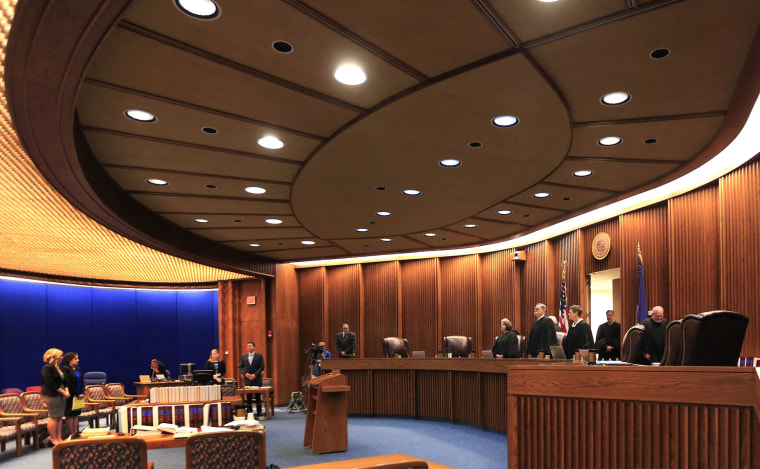TOPEKA, Kan. — Some LGBTQ people in Kansas who wanted to raise children born to unmarried partners they couldn't legally marry can be denied contact with the children when the couples split up. An attorney on Tuesday urged the state's highest court to make that far less likely to happen.
The Kansas Supreme Court heard arguments in two cases, each brought by a woman who was the unmarried partner of another woman who became a mother through artificial insemination. The couples broke up; the biological mothers eventually kept their former partners from the children and married other women after the U.S. Supreme Court declared same-sex marriage legal across the nation in 2015.

Kansas' highest court ruled in a 2013 case involving a lesbian couple that under state law, an unmarried partner legally can be considered a parent of a non-biological child. However, the couple in that case had a written agreement about parenting, while the women in the later cases did not, leading trial-court judges to rule against them.
Valerie Moore, a Kansas City-area attorney representing both women seeking access to children, argued that the law — traditionally used to force absent, unmarried men to support children they father — does not require a formal written or verbal parenting agreement. Instead, she said, it's enough that people hold themselves out as parents.
In effect, Moore argued that the women should have rights similar to that of divorced parents who move out of ex-spouses' homes. She argued that denying her clients access to the children is unfair because Kansas didn't allow them to marry before the children were born.
“These children entered the world with two parents,” Moore told the justices during arguments in one of the cases. “We're just asking for that to continue.”
In more than 30 states, including Kansas, laws or court decisions either allow “second-parent” adoptions by unmarried partners or grant some parental rights based on a partner's involvement parenting or in consenting to a partner's artificial insemination, according to data compiled by the National Center for Lesbian Rights.
The 2013 state Supreme Court decision makes Kansas “somewhat more progressive” than other states, said Cathy Sakimura, the center's family law director.
“Kansas actually has very good law, I think, and really should be protecting a wide range of families,” Sakimura said. “I think it's just not as clear as it could be to people because it's not in the actual (legal) code.”
However, Kansas Supreme Court justices questioned Moore about whether adopting her position could grant parental rights to adults who have few ties to non-biological children. Justice Carol Beier suggested that granting others parental rights could be “in tension” with a biological parent's "constitutional right to raise a child” as he or she sees fit.
Adam Hall, a Lawrence attorney representing one of the biological mothers, said requiring a verbal or written agreement provides families with certainty and warned that adopting Moore's position could disrupt children's and biological mothers' lives later.
“There's also a considerable danger that there will be substantial litigation,” he told the justices.
In both cases, the women and the children are referred to only by their initials.
In one case, out of Butler County outside of Wichita, T.F. and K.L. were together seven years before T.F. gave birth to a girl in 2013. They split in 2014 and K.L. sought the right to see the girl.
In the other case, from Crawford County in southeast Kansas, E.L. and M.S. broke up about a year after E.L. gave birth to twin boys in 2015. M.S. covered $30,000 in medical, day care and other expenses and continued to see the boys for months after the split, but the judge concluded she'd not been a parent by having an affair and acting inappropriately.
Tom Witt, executive director of the LGBTQ-rights group Equality Kansas, said it's atypical but “not rare” for a former same-sex partner to be denied contact with a child.
“This is absolutely one of the reasons there was a fight for marriage equality,” Witt said. “If these people were living as common law couples, they met all the requirements of common law couples, then the judge and courts should be treating them as though they're married or were married.”

